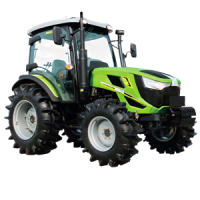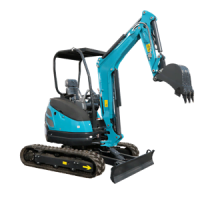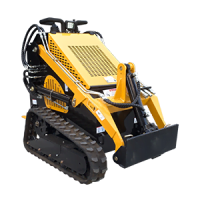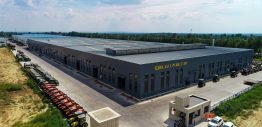In the world of agriculture, efficiency is the key to success. Farmers are constantly looking for ways to increase productivity, reduce labor costs, and maximize their yields. One of the most significant advancements in agriculture technology has been the development of modern farm tractors. These powerful machines have revolutionized the way farmers work the land, significantly boosting efficiency and overall productivity. In this comprehensive guide, we will explore the various ways in which modern farm tractors have transformed agriculture, and how they continue to drive the industry forward.
Introduction to Modern Farm Tractors
Modern farm tractors are not your grandfather’s tractors. They have evolved into sophisticated, high-tech machines equipped with cutting-edge features and technologies. These tractors are designed to handle a wide range of tasks on the farm, from plowing and planting to harvesting and transportation. The following sections will delve deeper into the ways in which modern farm tractors have revolutionized agriculture.
Increased Power and Performance
Enhanced Engine Technology
One of the most significant advancements in modern farm tractors is the improvement in engine technology. These tractors are equipped with powerful engines that deliver higher torque and horsepower, allowing them to handle heavy-duty tasks with ease. This increased power translates into faster work and greater efficiency on the farm.
Precision Agriculture
Modern tractors are equipped with GPS and precision agriculture technologies that enable farmers to perform tasks with remarkable accuracy. This precision not only reduces waste but also ensures that every inch of the field is used optimally. Farmers can plant seeds, apply fertilizers, and manage irrigation systems with unparalleled precision, resulting in higher crop yields.
Versatility and Adaptability
Multiple Attachments
Modern farm tractors come with a wide range of attachments and implements that can be quickly and easily swapped out. This versatility allows farmers to perform various tasks with the same tractor, eliminating the need for multiple machines. From plowing and tilling to seeding and harvesting, modern tractors can do it all.
Comfort and Ergonomics
Farmers spend long hours operating tractors, and modern designs prioritize operator comfort and ergonomics. Spacious cabs with air-conditioning, ergonomic seating, and user-friendly controls make the work more enjoyable and less physically demanding. This comfort leads to increased productivity and reduced operator fatigue.
Fuel Efficiency and Sustainability
Eco-Friendly Engines
Modern tractors are designed with sustainability in mind. They feature eco-friendly engines that reduce emissions and minimize the tractor’s environmental impact. This not only benefits the environment but also helps farmers comply with increasingly stringent emissions regulations.
Fuel Efficiency
Advanced engine management systems optimize fuel consumption, ensuring that tractors operate efficiently and cost-effectively. This is a crucial factor in reducing operating expenses for farmers while maintaining productivity.
Connectivity and Data Management
Telematics and Data Collection
Modern tractors are equipped with telematics systems that collect valuable data about the tractor’s performance and the work being done. This data can be analyzed to make informed decisions about farming practices, leading to increased efficiency and better crop management.
Remote Monitoring and Control
Farmers can remotely monitor and control their tractors using smartphones or computers. This allows for real-time adjustments, reducing downtime and ensuring that the tractor is always operating at peak performance.
Reduced Labor Requirements
Automation and Robotics
Modern farm tractors can be equipped with automation and robotics technology, further reducing the need for manual labor. Autonomous tractors can perform tasks like planting and harvesting with minimal human intervention, making farming operations more efficient and cost-effective.
Labor Allocation
With the help of modern tractors, farmers can allocate labor resources more efficiently. Tasks that once required multiple laborers can now be accomplished by a single operator, allowing farms to reallocate labor to other essential activities.
Improved Crop Management
Soil Health
Modern tractors are equipped with sensors and technology that assess soil health and make real-time recommendations for soil improvement. This leads to healthier crops and higher yields over time.
Pest and Disease Management
Integrated technology in modern tractors assists in monitoring for pests and diseases, allowing for timely intervention and reducing crop losses. This proactive approach contributes to overall productivity.
FAQ
Are modern farm tractors expensive to purchase?
Modern farm tractors come in a range of sizes and models, with varying price points. While some high-end models can be expensive, there are also more affordable options available. Additionally, the increased efficiency and productivity they offer often justify the initial investment.
Do modern tractors require a lot of maintenance?
Modern tractors are designed with durability and ease of maintenance in mind. Regular maintenance is necessary, but advancements in technology have made it easier for farmers to keep their tractors in excellent working condition.
Can modern tractors be used in small-scale farming operations?
Yes, modern tractors are available in different sizes to suit the needs of both large-scale and small-scale farming operations. There are compact models that are well-suited for smaller farms.
How do I choose the right modern tractor for my farm?
Choosing the right modern tractor depends on factors such as the size of your farm, the specific tasks you need to perform, and your budget. Consulting with a knowledgeable dealer or agricultural expert can help you make an informed decision.
Conclusion
Modern farm tractors have transformed agriculture by significantly improving efficiency and productivity. Their increased power, versatility, and advanced technologies have made farming more sustainable and profitable. As technology continues to advance, we can expect modern tractors to play an even more significant role in shaping the future of agriculture, helping farmers meet the growing demand for food while minimizing environmental impact.







-1.png)